AIRBUS Bundle
Unveiling Airbus: What Drives Its Mission, Vision, and Values?
Explore the foundational principles steering one of the world's leading aerospace companies. Understanding the AIRBUS SWOT Analysis is key to grasping its strategic direction and long-term objectives. These statements are not just words; they are the very blueprint for Airbus's global impact.
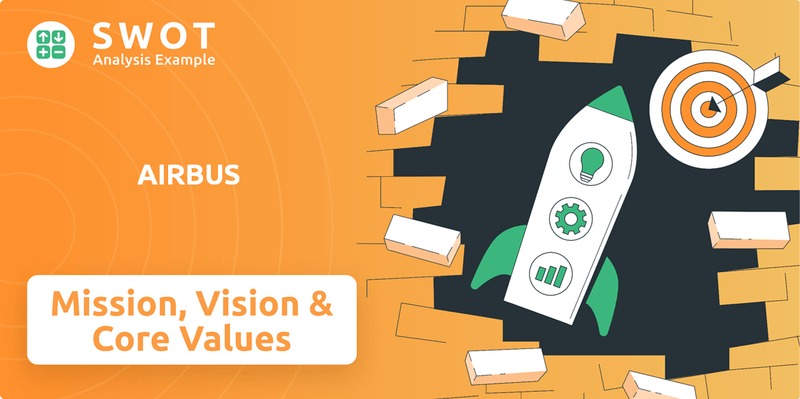
Delving into the
Key Takeaways
- Airbus's mission and vision emphasize sustainable aerospace and innovative aviation solutions.
- Six core values—Customer focus, Integrity, Respect, Creativity, Reliability, and Teamwork—guide Airbus's operations.
- Sustainability and innovation are central to Airbus's strategic direction and future success.
- Airbus invests heavily in R&D for cleaner technologies and sustainable aviation fuels.
- Continued alignment with guiding principles is crucial for navigating industry challenges and driving innovation.
Mission: What is AIRBUS Mission Statement?
Airbus's mission is 'To pioneer sustainable aerospace for a safe and united world.'
Let's delve into the core of Airbus's operational philosophy: its mission. Understanding the Owners & Shareholders of AIRBUS requires a grasp of the company's guiding principles. This mission statement encapsulates Airbus's commitment to innovation, safety, and global connectivity, shaping its strategic direction and operational focus.
Airbus actively pursues sustainable solutions. This includes investing heavily in research and development for cleaner technologies, such as Sustainable Aviation Fuels (SAF) and hydrogen-powered aircraft. Airbus aims to have its aircraft capable of flying on up to 100% SAF by 2030.
Safety is paramount in Airbus's mission. The company designs and manufactures aircraft, helicopters, and other aerospace products to the highest safety standards. This commitment is reflected in rigorous testing and quality control processes.
Airbus facilitates global connectivity by providing aircraft and services that enable people and goods to travel across the world. This aspect of the mission underscores the company's role in fostering international relations and economic activity.
Airbus's mission targets a broad range of customers, including commercial airlines, defense organizations, space agencies, and private operators. This diverse customer base reflects the company's wide-ranging portfolio of products and services.
The market scope for Airbus is global. The company operates worldwide, with a significant presence in Europe, the Americas, Asia-Pacific, and the Middle East. This global footprint allows Airbus to serve customers across various regions and markets.
Airbus's unique value proposition lies in pioneering sustainable solutions for the future of aerospace. This includes developing fuel-efficient aircraft, exploring alternative propulsion systems, and reducing the environmental impact of air travel. The A321XLR, for instance, offers a significant reduction in fuel burn and emissions compared to previous models.
The Airbus mission is strongly oriented towards innovation and sustainability, with a clear customer-centric approach by aiming to provide safe and reliable products. For example, Airbus is investing heavily in the development of hydrogen-powered aircraft, with the ambition of introducing a zero-emission commercial aircraft by 2035. In 2023, Airbus delivered 735 commercial aircraft, demonstrating its continued commitment to its mission. This commitment to sustainability and innovation is not just a statement; it's a core part of the Airbus strategy and a key driver of its Airbus goals.
AIRBUS SWOT Analysis
- Complete SWOT Breakdown
- Fully Customizable
- Editable in Excel & Word
- Professional Formatting
- Investor-Ready Format
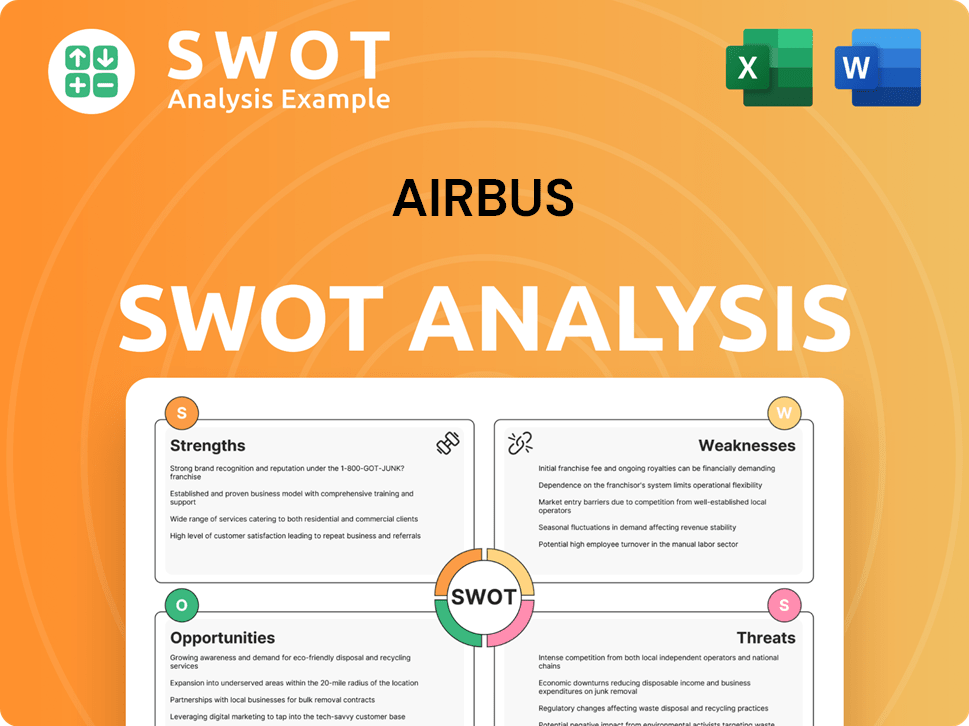
Vision: What is AIRBUS Vision Statement?
Airbus's vision is centered on leading the aerospace industry in environmental performance and enhancing global connectivity.
Let's delve deeper into the visionary aspirations of Airbus.
The Airbus vision is distinctly future-oriented. It's about pioneering sustainable aviation solutions and ensuring that air travel continues to connect the world. This forward-thinking approach positions Airbus at the forefront of industry innovation.
A core tenet of the Airbus vision is environmental leadership. The company is heavily invested in research and development, particularly in hydrogen-powered aircraft. Their goal is to introduce a zero-emission commercial aircraft by 2035, a bold ambition reflecting their commitment to sustainability.
Airbus aims to enhance global connectivity. They anticipate significant demand for new aircraft, projecting a need for over 40,850 new passenger and freighter aircraft between 2024 and 2043. This reflects their vision of a world where air travel remains accessible and efficient for a growing population.
The Airbus vision is aspirational, yet grounded in reality. The company's substantial investments in advanced technologies, such as sustainable aviation fuel (SAF) and hydrogen, demonstrate a commitment to achieving its goals. This blend of ambition and pragmatism is key to their long-term success.
The Airbus mission and vision are intertwined with maintaining market leadership. Their focus on innovation, particularly in sustainable technologies, is designed to disrupt the industry and secure their position as a leading aerospace manufacturer. The company's commitment to technological advancement is evident in its continuous investment in R&D, with an estimated €3.6 billion spent in 2023.
Airbus's strategic objectives are directly linked to its vision. These objectives include increasing production rates to meet growing demand and investing in new technologies to reduce the environmental impact of aviation. Further insights into the company's approach can be found in the Marketing Strategy of AIRBUS article.
The Airbus vision statement explained is a commitment to a sustainable and interconnected future for air travel. The Airbus company is actively working towards this vision through technological innovation and strategic investments, ensuring its position at the forefront of the aerospace industry. Understanding the Airbus mission and Airbus core values provides further context to this ambitious vision. Key elements of the Airbus' long-term vision for the future include a focus on environmental performance and global connectivity, which are integral to the company's strategic mission and objectives. The Airbus' vision for sustainable aviation is a key driver of its innovation efforts.
AIRBUS PESTLE Analysis
- Covers All 6 PESTLE Categories
- No Research Needed – Save Hours of Work
- Built by Experts, Trusted by Consultants
- Instant Download, Ready to Use
- 100% Editable, Fully Customizable
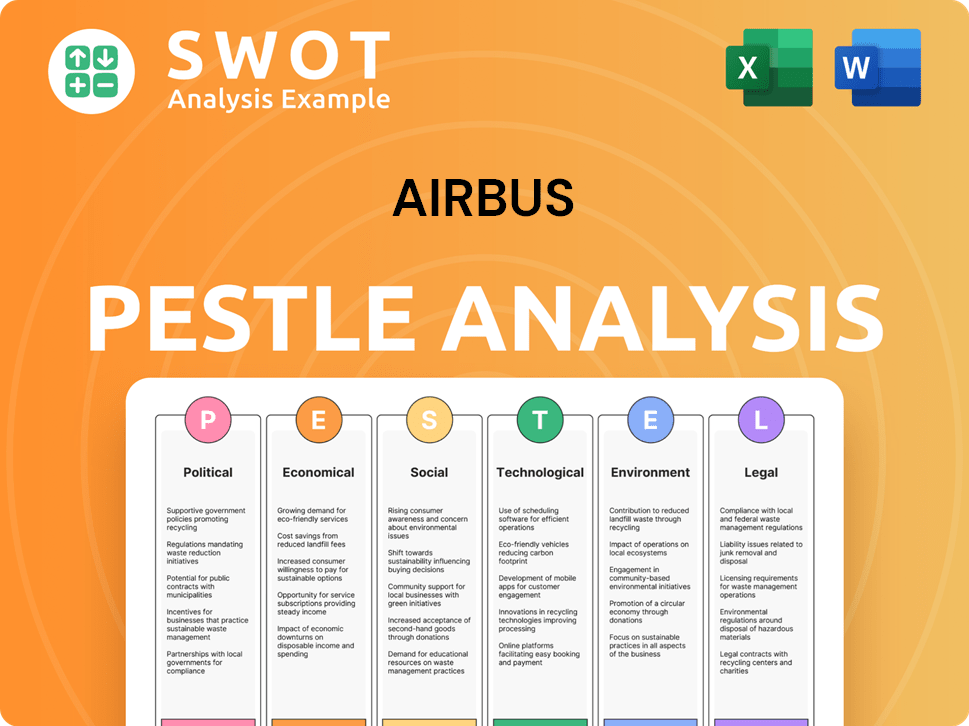
Values: What is AIRBUS Core Values Statement?
Understanding the core values of a company is crucial for grasping its operational philosophy and long-term objectives. Airbus, a leader in the aerospace industry, operates under a set of guiding principles that shape its corporate culture and strategic direction.
Customer focus is paramount at Airbus, driving the company to deliver timely, valuable, and cost-effective solutions. This value is evident in their product development, such as the A320 family, which has secured over 16,000 orders as of late 2024, and their commitment to understanding customer needs to provide sustainable solutions. This customer-centric approach helps Airbus maintain a strong market position and adapt to evolving industry demands.
Integrity is a cornerstone of Airbus's operations, emphasizing ethical conduct and transparency in all business practices. The company is committed to ethical governance and compliance with regulatory standards, ensuring that all activities are conducted with the highest ethical standards. This commitment helps maintain trust with stakeholders and supports the company's reputation.
Respect at Airbus guides daily interactions, fostering an inclusive environment where colleagues and customers are valued. This value promotes open communication and diversity, valuing individual contributions to enhance innovation and collaboration. The company's diverse workforce, with over 130,000 employees worldwide, benefits from this inclusive environment.
Airbus encourages creativity at all levels, investing heavily in research and development to foster innovation. This is evident in their significant R&D investments, which totaled €3.5 billion in 2024, and their focus on sustainable aviation technologies and advanced aircraft designs. This commitment to innovation helps Airbus stay ahead in a competitive market.
Airbus's core values, including Customer Focus, Integrity, Respect, and Creativity, are integral to its operational philosophy and strategic direction. These values, combined with Reliability and Teamwork, enable Airbus to maintain its leadership in the aerospace industry. Understanding these core principles is essential to grasp the company's approach to innovation, sustainability, and stakeholder engagement. If you want to know more about the company, you can read about the Competitors Landscape of AIRBUS.
How Mission & Vision Influence AIRBUS Business?
Airbus's mission and vision are not just aspirational statements; they are the bedrock upon which the company builds its strategic decisions. These guiding principles shape every facet of Airbus, from research and development to market expansion and partnerships.
Airbus's commitment to its mission and vision is clearly demonstrated through its substantial investment in research and development.
- In 2022, Airbus invested a significant €3.2 billion in R&D.
- This investment is primarily focused on sustainable aviation technologies, aligning with their mission to pioneer sustainable aerospace.
- This has led to advancements like the A321XLR's fuel efficiency.
Airbus's vision for a decarbonized future is driving its pursuit of sustainable aviation fuels (SAF) and hydrogen propulsion. This strategic move underscores their commitment to environmental sustainability and aligns with their long-term goals.
The company's mission to connect people globally is reflected in its strategic focus on market expansion and increasing production capacity. Airbus is strategically increasing its production to meet sustained demand.
Airbus's strategic direction influences its approach to partnerships and acquisitions, supporting its growth as an aerospace and defense leader. Exploring consolidation in the space sector and strategic opportunities with other companies is a key part of their growth strategy.
Airbus's strategic decisions are measured by key performance indicators (KPIs) such as aircraft deliveries, revenue, and progress towards sustainability targets. These metrics help to track the company's progress towards its goals.
Guillaume Faury, Airbus CEO, emphasizes the importance of core principles like safety, quality, integrity, compliance, and security in guiding all actions. These principles are essential for maintaining trust and ensuring long-term success.
In 2024, Airbus delivered 766 commercial aircraft, and the company's revenue reached €69.2 billion. These figures demonstrate the company's strong performance and its ability to execute its strategic plans.
The influence of the Airbus mission and vision is evident in every strategic decision the company makes. By prioritizing innovation, sustainability, and customer focus, Airbus is positioning itself for continued success in the aerospace industry. Ready to explore how Airbus can improve its core values?
AIRBUS Business Model Canvas
- Complete 9-Block Business Model Canvas
- Effortlessly Communicate Your Business Strategy
- Investor-Ready BMC Format
- 100% Editable and Customizable
- Clear and Structured Layout
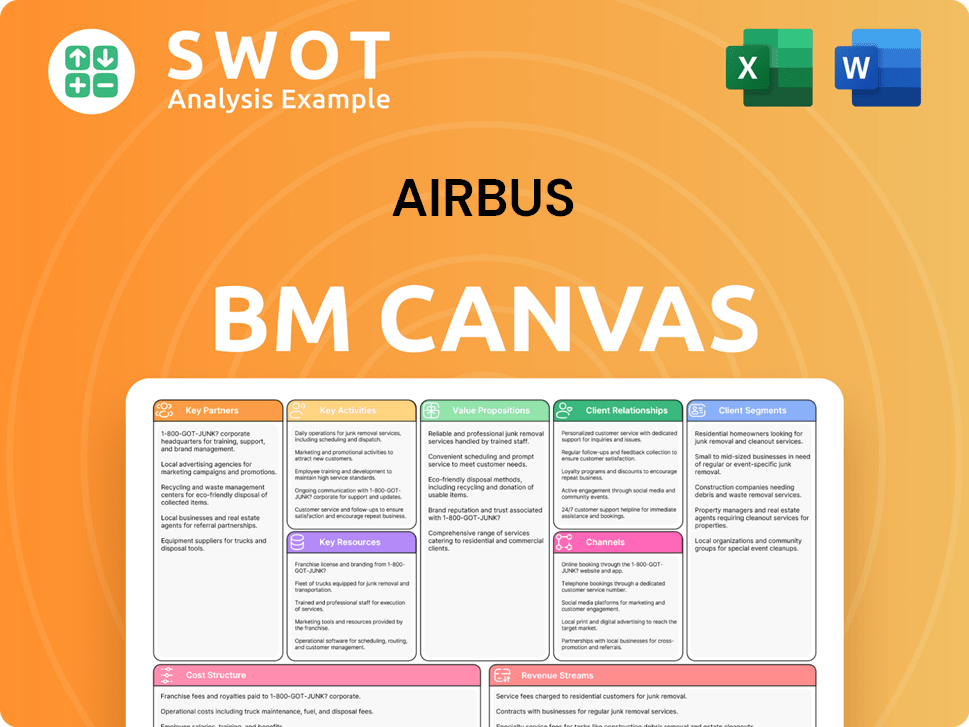
What Are Mission & Vision Improvements?
While Airbus's current statements lay a strong foundation, there's always room for strategic refinement to ensure they remain competitive and resonate with stakeholders. These improvements can help Airbus better communicate its holistic approach to sustainable and responsible aerospace leadership in a rapidly changing global context and achieve its Airbus goals.
To strengthen its forward-looking statements, Airbus could explicitly integrate digital transformation into its core mission or vision. Highlighting the role of digitalization, including digital twins and advanced data analytics, in achieving its goals will further cement its commitment to innovation. This is particularly relevant, as the global digital transformation market in aerospace is projected to reach $89.7 billion by 2030, growing at a CAGR of 12.4% from 2023 to 2030, according to a recent report.
Airbus could enhance its commitment to social impact and community engagement within its core statements, expanding on the idea of a 'united world.' While the Airbus Foundation undertakes humanitarian missions, embedding this commitment more visibly in their mission or vision could resonate more strongly with socially conscious stakeholders. This aligns with the growing emphasis on Environmental, Social, and Governance (ESG) factors, as investors increasingly prioritize companies with strong social impact strategies.
Comparing with industry best practices, some competitors might have more explicitly defined social responsibility aspects beyond environmental sustainability in their core statements. This can involve emphasizing fair labor practices, diversity and inclusion, and community development. This could help Airbus better align with the evolving expectations of a diverse and increasingly informed stakeholder base.
As the industry faces increasing scrutiny on supply chain ethics and sustainability, explicitly referencing the importance of responsible sourcing and supply chain collaboration within their values or mission could reinforce their commitment to ethical practices. This is crucial, given that supply chain disruptions cost the aerospace industry billions annually, and ethical sourcing is becoming a significant differentiator. For example, the global aerospace supply chain market is estimated to reach $780 billion by 2027.
How Does AIRBUS Implement Corporate Strategy?
Implementing a company's mission, vision, and core values is crucial for translating strategic intent into tangible actions and outcomes. This process ensures that the organization's aspirations are not merely aspirational but are actively pursued and realized across all levels of the business.
Airbus demonstrates its commitment to its Mission, Vision & Core Values of AIRBUS through significant investments and initiatives, particularly in sustainable aviation. This commitment is a direct implementation of its vision for a sustainable future in the aerospace industry.
- Sustainable Aviation Fuel (SAF) Integration: Airbus aims for its aircraft to be 100% SAF compatible by 2030. This involves continuous testing and certification processes to ensure that its aircraft can operate efficiently using SAF.
- Hydrogen Propulsion Systems Development: Airbus is actively developing hydrogen propulsion systems, including the ZEROe project, to explore the feasibility of hydrogen-powered aircraft. This initiative aligns with its long-term vision for reducing carbon emissions.
- Internal SAF Usage: Airbus utilizes SAF in its own internal operations, including test flights and employee travel, to reduce its carbon footprint.
- Financial Commitment: Airbus has committed significant financial resources to these sustainability initiatives. For example, the ZEROe project represents a multi-billion euro investment.
Leadership plays a pivotal role in reinforcing the Airbus mission and vision. CEO Guillaume Faury and other key executives consistently communicate the company's strategic priorities and core values to ensure alignment throughout the organization.
Leaders actively communicate strategic priorities, such as production ramp-up and decarbonization efforts, through various channels. This includes internal communications, town hall meetings, and external presentations.
The leadership team consistently emphasizes core values like safety, quality, integrity, compliance, and security as guiding principles for all employees.
Airbus communicates its mission, vision, and core values to stakeholders through its official website, annual reports, and public statements. These channels provide transparency and reinforce the company's commitment to its principles.
Airbus demonstrates alignment between its stated values and actual practices through concrete examples. This alignment is crucial for building trust and ensuring that the company's actions reflect its core principles.
- Digital Twins: The use of digital twins in manufacturing enhances efficiency and sustainability, reflecting creativity and reliability. This technology allows for virtual testing and optimization, reducing waste and improving resource utilization.
- Diversity and Inclusion: Airbus's commitment to diversity and inclusion in the workplace demonstrates respect and teamwork. The company actively promotes a diverse workforce and inclusive culture.
- Sustainability Targets: Airbus has established sustainability targets, including reducing industrial emissions and the emissions intensity of its aircraft. Some of these targets are validated by the Science Based Targets initiative (SBTi).
- Supply Chain Engagement: Airbus engages with its supply chain to ensure adherence to environmental and social responsibility standards. This includes audits and assessments to promote sustainable practices throughout its value chain.
AIRBUS Porter's Five Forces Analysis
- Covers All 5 Competitive Forces in Detail
- Structured for Consultants, Students, and Founders
- 100% Editable in Microsoft Word & Excel
- Instant Digital Download – Use Immediately
- Compatible with Mac & PC – Fully Unlocked
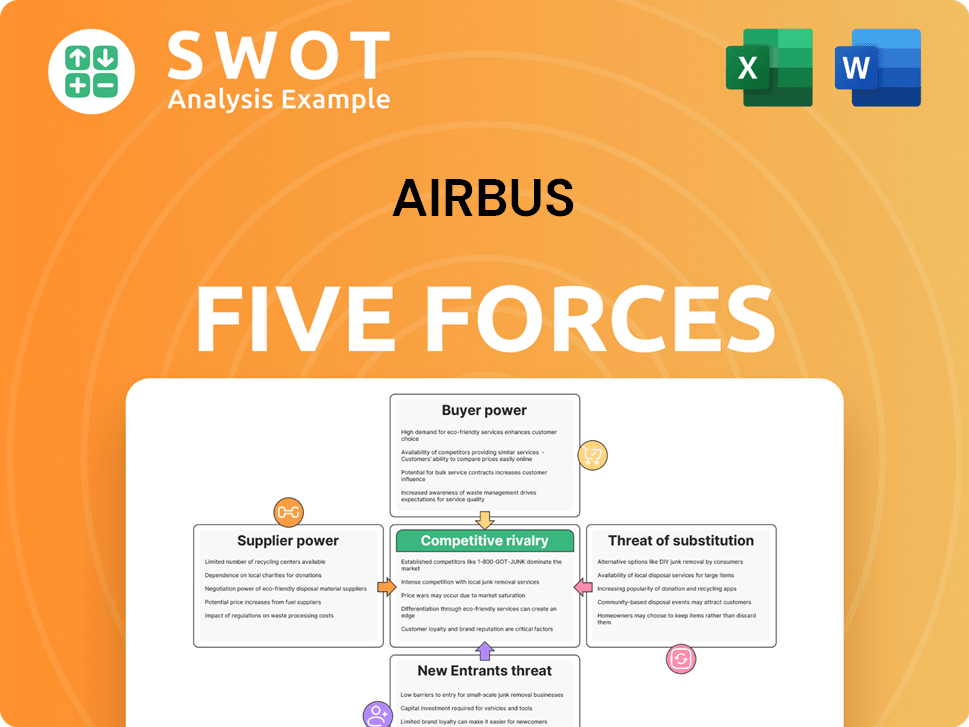
Related Blogs
- What are Mission Vision & Core Values of AIRBUS Company?
- What is Competitive Landscape of AIRBUS Company?
- What is Growth Strategy and Future Prospects of AIRBUS Company?
- How Does AIRBUS Company Work?
- What is Sales and Marketing Strategy of AIRBUS Company?
- Who Owns AIRBUS Company?
- What is Customer Demographics and Target Market of AIRBUS Company?
Disclaimer
All information, articles, and product details provided on this website are for general informational and educational purposes only. We do not claim any ownership over, nor do we intend to infringe upon, any trademarks, copyrights, logos, brand names, or other intellectual property mentioned or depicted on this site. Such intellectual property remains the property of its respective owners, and any references here are made solely for identification or informational purposes, without implying any affiliation, endorsement, or partnership.
We make no representations or warranties, express or implied, regarding the accuracy, completeness, or suitability of any content or products presented. Nothing on this website should be construed as legal, tax, investment, financial, medical, or other professional advice. In addition, no part of this site—including articles or product references—constitutes a solicitation, recommendation, endorsement, advertisement, or offer to buy or sell any securities, franchises, or other financial instruments, particularly in jurisdictions where such activity would be unlawful.
All content is of a general nature and may not address the specific circumstances of any individual or entity. It is not a substitute for professional advice or services. Any actions you take based on the information provided here are strictly at your own risk. You accept full responsibility for any decisions or outcomes arising from your use of this website and agree to release us from any liability in connection with your use of, or reliance upon, the content or products found herein.